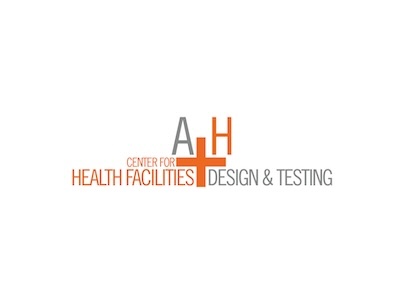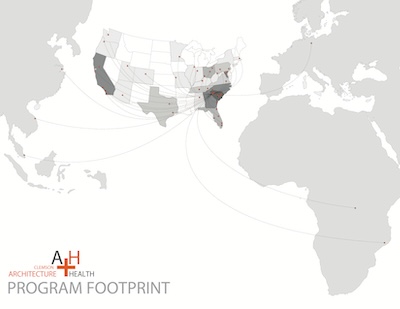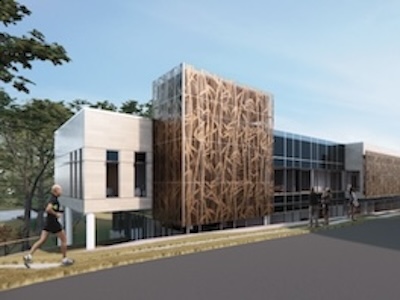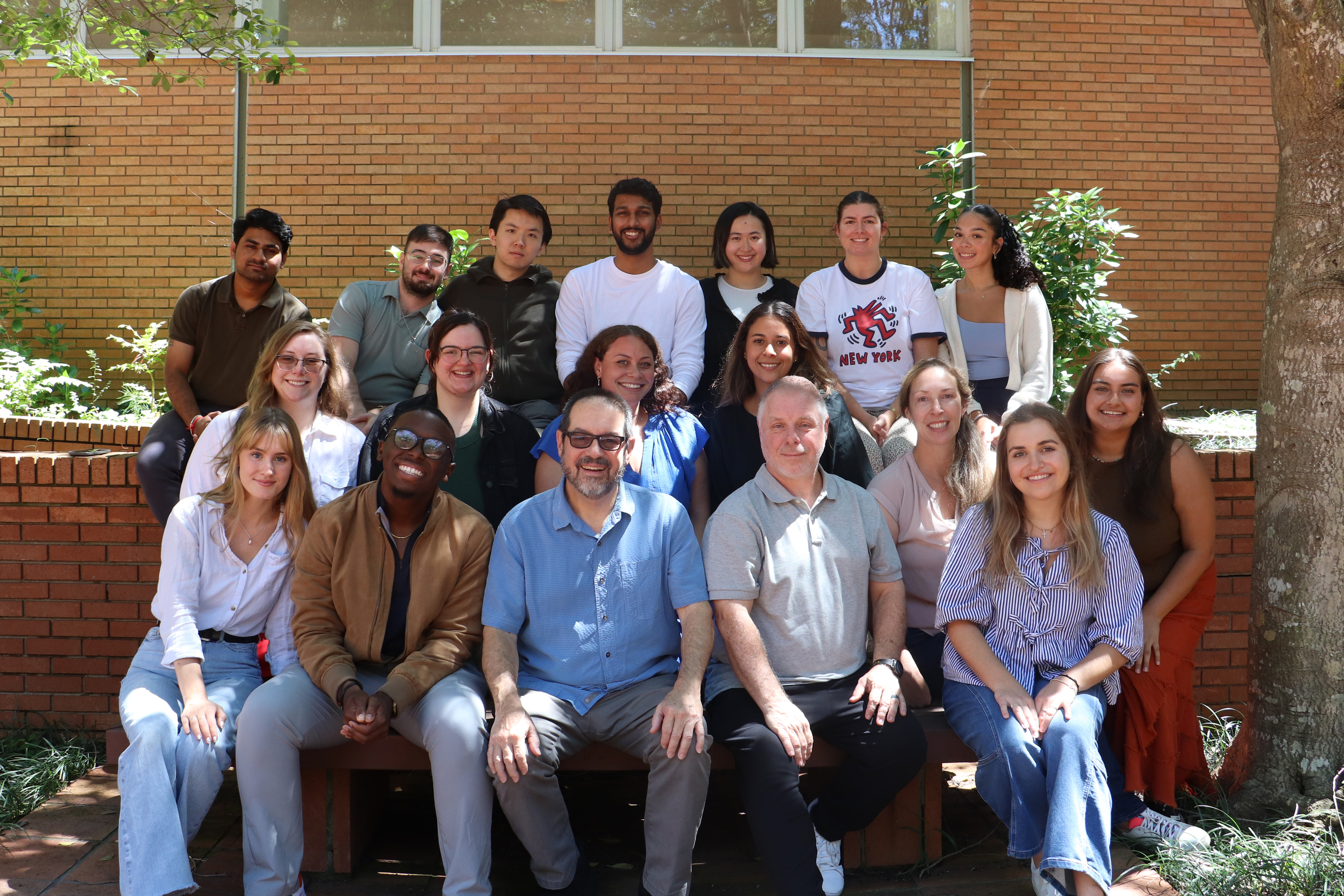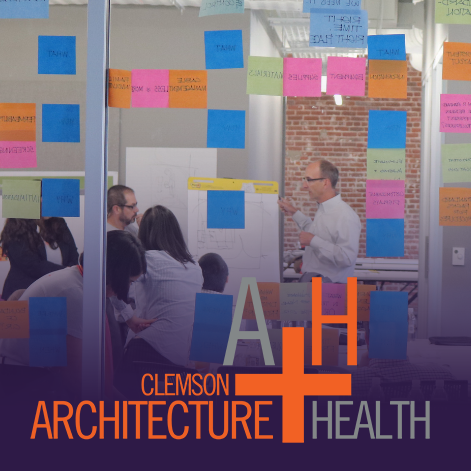Architecture + Health
Architecture + Health Programs include a comprehensive framework of coursework appropriate for both the practice of architecture and a focused area of expertise in the study and design of an Architecture for Health. The intent of the A+H concentration, which is the most structured and established program of its type in the United States, is to develop the generalist-specialist-graduates who can creatively work in both modes. The curriculum concentration includes both the study of health facility design and the study of relationships between architectural settings and their impact on the health and well-being of individuals, communities, and global ecosystems. The primary purpose of the concentration is to study the design of healthcare environments, how architectural environments impact health and how to create architectural settings that support the health and well-being of individuals and larger populations. Our Master of Architecture in Architecture + Health, is a NAAB-accredited professional degree and a STEM Designated Graduate Degree Program. (CIP Code 04.0902 (architectural and building sciences/technology)
Application Information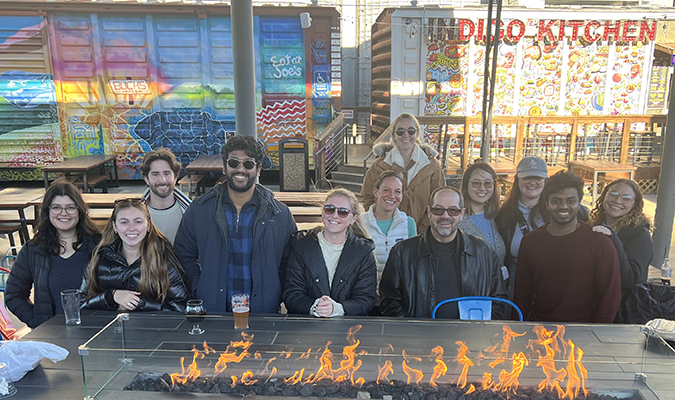
Within the framework of NAAB accredited Master of Architecture [M. Arch] degree, the Architecture + Health Concentration includes seminar courses and studio work appropriate for both a general professional degree and a concentrated area of study in Architecture + Health. Studio design projects and seminar courses examine architecture-health relationships for settings and conditions ranging from entire communities to specific projects and individual spaces. The emphasis in the studio is on design excellence within the framework of the complex demands found in the practice of healthcare architecture. Student work must stand up critically at all levels of architectural consideration.
The Architecture + Health concentration is demanding in the scope of its professional studies, with most of the coursework designated for specific areas of learning which are currently only offered on the main campus in Clemson. Students may take advantage of off-campus programs for a maximum of one semester with the program director's approval. A thesis option is offered in the Architecture + Health concentration and is developed during the final year of study. The thesis deals with architectural topics as they relate to health and well-being.
Learning Outcomes:
- Knowledge of best practices and emerging trends in healthcare architecture
- Knowledge of and ability to apply evidence-based design practices
- Understand human health safety and welfare issues with respect to the built environment
- Understand professional ethics, practice regulations and business practices
- Understand the fundamentals of regulations for buildings and sites
- Understand building systems, assemblies, and methods of construction
- Ability to synthesize user requirements, regulations, site conditions, accessible design, and environmental impact.
- Ability to make design decisions through the integration of building envelop and assemblies, structural systems, environmental systems, life safety systems and building performance.
- Engage in sponsored service-learning programming & design projects with actual clients
- Participate in regional and national AIA Academy of Architecture for Health Conferences
- Engage in participatory interdisciplinary and cross-disciplinary learning, research, and design initiatives.
STEM Designated Graduate Degree Program:
CIP Code 04.0902 (architectural and building sciences/technology)
-
Master of Architecture in Architecture + Health (M. Arch. A+H), a NAAB-accredited professional degree
-
Master of Architecture + Health Degree Tracks
Clemson offers multiple tracks toward earning the professional, NAAB-accredited (NAAB accreditation) Master of Architecture (M. Arch.) degree:
- The M. Arch. I in Architecture + Health is a three-year, 90-credit hour degree track for students without a portfolio of 6-8 semesters of strong architecture studio work. Students in the M. Arch. I track have diversity of undergraduate majors, including architecture and architectural studies, and various design (art, city planning, urban design, landscape architecture, industrial design, and others) and non-design backgrounds (business, economics, engineering, literature, psychology, and other fields).
- The M. Arch. II in Architecture + Health is a two-year, 60-credit hour degree track for students with a pre-professional Bachelor degree (BA or BS) in Architecture and strong portfolios documenting 6 to 8 semesters of design studio work. The M. Arch. II track is an advanced placement track and a BA or BS in a pre-professional architecture program is a minimum requirement. A competitive portfolio is also required. In the context of applicant pool, advanced placement is determined by the Admissions Committee and Architecture + Health Program Director during the application and portfolio review process.
-
Plan of Study - Master of Architecture + Health
Master of Architecture
The required course study of the Architecture + Health Curriculum consists of two and three year tracks, both with an option for comprehensive or thesis projects.The first year of the three-year track is within Clemson's general architecture program, this year allows students without an architectural background to receive core architectural knowledge before their two years within the Architecture + Health studio. This first year also gives opportunities for new students to study abroad.
The two-year track is based on the main campus in Clemson, SC and places students with advanced standing upon admissions and an undergraduate degree in architecture directly into the Architecture + Health studio.
STEM Designated Graduate Degree Programs:
CIP Code 04.0902 (architectural and building sciences/technology)
-
Master of Architecture in Architecture + Health (M. Arch. A+H), a NAAB-accredited professional degree
To learn more or set up a visit, contact David Allison, Director of Graduate Studies in Architecture + Health and Alumni Distinguished Professor of Architecture, adavid@clemson.edu
Master of Architecture + Health Plan of Study
FIRST YEAR: CORE STUDIOS
Three-Year (MArch I) Track (90 Credits) begins here.Comprehensive Project Option
Thesis Option
Semester 1 - FALL
6 ARCH 8410 Architecture Studio I
3 ARCH 8100 Visualization and Representation I
3 ARCH 8600 Architectural History and Theory I
3 ARCH 8700 Structures I
15 credits
Semester 1 - FALL
6 ARCH 8410 Architecture Studio I
3 ARCH 8100 Visualization and Representation I
3 ARCH 8600 Architectural History and Theory I
3 ARCH 8700 Structures I
15 credits
Semester 2 - SPRING
6 ARCH 8420 Architectural Studio II
3 ARCH 8110 Visualization and Representation II
3 ARCH 8610 Architectural History and Theory II
3 ARCH 8710 Structures II
15 credits
Semester 2 - SPRING
6 ARCH 8420 Architectural Studio II
3 ARCH 8110 Visualization and Representation II
3 ARCH 8610 Architectural History and Theory II
3 ARCH 8710 Structures II
15 credits
FIRST SUMMER (HEALTHCARE ARCHITECTURE INTERNSHIP)
SECOND YEAR: INTERMEDIATE STUDIOS
Two-Year (MArch II) Track (60 Credits) begins here.Semester 3 – FALL 1
6 ARCH 8950 Architecture + Health Studio: Selected Projects
3 ARCH 8210 Research Methods
3 ARCH 8720 Productions and Performance + 8721 Lab
3 ARCH 8730 Environmental Systems + 8731 Lab
15 credits
Semester 3 – FALL 1
6 ARCH 8950 Architecture + Health Studio: Selected Projects
3 ARCH 8210 Research Methods
3 ARCH 8720 Productions and Performance + 8721 Lab
3 ARCH 8730 Environmental Systems + 8731 Lab
15 credits
Semester 4 - SPRING
6 ARCH 8960 Architecture + Health Studio: Tectonic Projects
3 ARCH 6880 Architectural Programming and Predesign
3 ARCH 8650 Topics in Health Policy, Planning and Administration
3 ARCH 6850 History and Theory: Architecture + Health
15 credits
Semester 4 - SPRING
6 ARCH 8960 Architecture + Health Studio: Tectonic Projects
3 ARCH 6880 Architectural Programming and Predesign
3 ARCH 8650 Topics in Health Policy, Planning and Administration
3 ARCH 6850 History and Theory: Architecture + Health
15 credits
SECOND SUMMER (HEALTHCARE ARCHITECTURE INTERNSHIP)
THIRD YEAR: ADVANCED STUDIOS
Semester 5 – FALL 2
6 ARCH 8970 Architecture + Health Studio: Hospital and Urban Design
3 ARCH 8860 Health Facilities Planning and Design
3 GRAD XXXX ELECTIVE
3 GRAD XXXX ELECTIVE
15 credits
Semester 5 – FALL 2
6 ARCH 8970 Architecture + Health Studio: Hospital and Urban Design
3 ARCH 8860 Health Facilities Planning and Design
3 GRAD XXXX ELECTIVE
3 ARCH 8580 Thesis Research
15 credits
Semester 6 - SPRING
6 ARCH 8920 Architecture + Health Comprehensive Studio
3 ARCH 8820 Building Economics, Costs and Legal Issues
3 ARCH 8740 Building Processes: Technical Resolution + 8741 Lab
3 GRAD XXXX ELECTIVE or ARCH 8710 Structures II*
15 credits
Semester 6 - SPRING
6 ARCH 8910 Architecture + Health Thesis Project
3 ARCH 8820 Building Economics, Costs and Legal Issues
3 ARCH 8740 Building Processes: Technical Resolution + 8741 Lab
3 ARCH 8590 Architecture + Health Thesis Manuscript
15 credits
STRUCTURES II: All students must have taken the equivalent of ARCH 8710 Structures II as undergraduates or must take this course in one of their elective options.
-
-
Plan of Study - Ph.D. in Planning, Design and the Built Environment - Built Environment + Health Concentration
Ph.D. Design and the Built Environment (DBE) - Built Environment + Health Concentration
The Richard A. McMahan School of Architecture’s Graduate Program is affiliated with Clemson University’s interdisciplinary Ph.D. in Design and the Built Environment (DBE).The Architecture + Health program is integrated with the DBE Built Environment + Health concentration. Architecture + Health professors Dina Battisto, Ph.D. and Anjali Joseph, Ph.D. serve as major advisers in the BE+H concentration.
The primary aim of the Built Environment and Health concentration area is to generate new knowledge and theories that demonstrate how human health and well-being may be improved through design. As such, this concentration area builds upon an evidence-based design philosophy where innovative architectural designs are measured using various performance metrics in an effort to produce a knowledge base that can be used to inform future design interventions. Through a specialized interdisciplinary curriculum, students will be prepared for a professional career in research, teaching, and other specialized fields that may advance theoretical, methodological and practical knowledge related to design for health.
- Healthy Communities
- Aging in Place
- Sustainable Community Design
- History and Theory
Contact:
Dr. Dina Battisto, Associate Professor of Architecture, dbattis@clemson.edu
Dr. Anjali Joseph, Associate Professor of Architecture, anjalij@clemson.edu -
Faculty
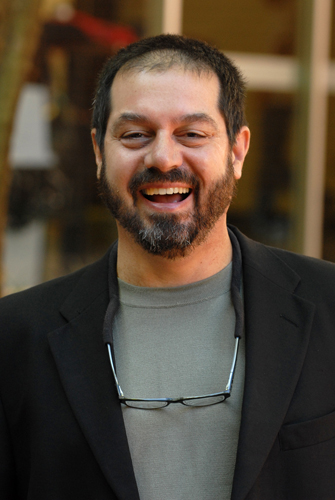 David Allison, FAIA, FACHA, NCARB
David Allison, FAIA, FACHA, NCARBB.S. Pre-Architecture, Clemson University (1978); M.Arch., Clemson University (1982)
Position
Alumni Distinguished Professor
Director of Graduate Studies in Architecture + Health
Richard A. McMahan School of Architecture, Clemson University
Faculty Fellow, Clemson University School of Health ResearchContact
Office: 2-144 Lee Hall
Email: adavid@clemson.eduBio
David Allison FAIA, FACHA is an Alumni Distinguished Professor and has served as the Director of Graduate Studies in Architecture + Health [A+H] at Clemson University since 1990. His teaching, research and scholarship involve the study of relationships between health, healthcare and the built environment. The A+H program at Clemson is nationally recognized for its focused curriculum and emphasis on design excellence within the discipline of healthcare architecture. It is committed to the integration of innovative design with academic scholarship and research in healthcare environments and healthy community planning and design, and it has won numerous national and international program and student awards for its work under Professor Allison’s direction.Professor Allison is also a Licensed Architect in South and North Carolina as well as a Fellow of the American Institute of Architects. He is also a board certified, founding member and Fellow of the American College of Healthcare Architects [ACHA], currently serves on the ACHA Board of Regents, and received its Lifetime Achievement Award in 2019. He is the founder of the Architecture for Health Educators Summit held annually as part of the joint AIA/AAH and ACHA Summer Leadership Summit. He is also a cofounder of an annual AIA Academy of Architecture for Health South Atlantic Regional Conference. He was selected in 2007 as one of “Twenty Making a Difference” nationally by Healthcare Design Magazine and identified again in 2009, 2010 and 2012 by a national poll conducted by the magazine as “one of the most influential people in healthcare design.” Design Intelligence Magazine named him one of the nation's 30 Most Admired Design Educators in 2013-14 and again in 2019. He was also recently recognized as the Center for Health Design 2019 Changemaker.
Dina Battisto, Ph.D
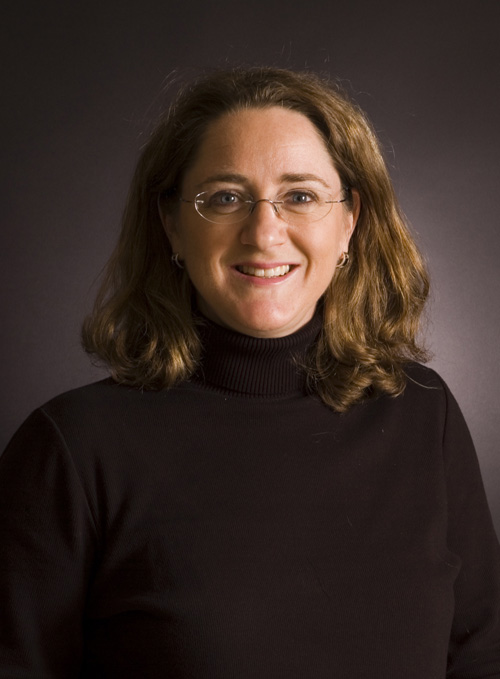
B.Arch, University of Tennessee - Knoxville; MArch, Clemson University (1993); Ph.D, University of Michigan
Position
Professor in Architecture + HealthCo-Director of the Ph.D. program
Richard A. McMahan School of Architecture, Clemson UniversityDina Battisto is Associate Professor in the Richard A. McMahan School of Architecture and also leads the Built Environment and Health Concentration in the interdisciplinary Planning, Design and Built Environment Ph.D. Program in the College of Architecture, Arts and Humanities. She earned a B.Arch from the University of Tennessee, a M.Arch from Clemson University, and M.S. and Ph.D. degrees from the University of Michigan. Her primary research areas include healthcare facility design, facility performance evaluations, sustainable design and aging in place. Since 2005, Dr. Battisto has been awarded as principal investigator over $1 million dollars of externally sponsored research. She is highly recruited for national and international conferences, actively publishes in scholarly journals and has won multiple national healthcare design awards. Dr. Battisto also serves as the Chair of the AIA’s Academy of Architecture for Health Foundation Grants Committee. In 2008, she was peer-nominated and selected by HEALTHCARE DESIGN Magazine as one of the top twenty in the nation advancing the future of healthcare design.Lyndsey Deaton, Ph.D, RA, AICP, PMP, LEED AP

B. Science in Architecture (Minor of International Affairs), Georgia Institute of Technology; M. Building Science Construction, Auburn University; Ph.D. Architecture, University of Oregon
Position
Assistant Professor in Architecture + HealthRichard A. McMahan School of Architecture, Clemson UniversityContactOffice: 2-143 Lee Hall
Email: ldeaton@clemson.eduBioEducated as an architect, planner, and urban researcher, Dr. Lyndsey Deaton is principally an urbanist, whose specialty is the study of policies, the urban design of public space, and community health. In 2021, Dr. Deaton was listed as one of the Georgia Tech Alumni Association’s 40 Under 40, an annual program that showcases how Tech graduates’ impact global industry and work to improve the way we live through diligence and expertise from an early age.Dr. Deaton specializes in creating space for underprivileged voices often based on gender, age, or ability through community-led design activism. Her research explores the hidden relationships between neoliberal planning policies and adolescents’ environmental experiences in low-income communities. As a peer-reviewed measure of significance, Lyndsey’s current work with adolescents received the Environmental Design Research Association’s Great Places Award (2021) for Research and the Architecture Research Center Consortium King Medal for Research Excellence (2020). Her research has been supported by the Julie & Rocky Dixon Foundation, the Sasakwa Young Leaders Fellowship Foundation, and Save the Children Australia.
At Clemson University, Dr. Deaton teaches graduate-level seminars on planning and programming as well as design studios in the Architecture + Health [A+H] program. She also teaches professionals at the U.S. Army Corps of Engineers (USACE) Learning Center, an accredited higher education institution. She was formerly the Director of the Urban Design Lab and an Adjunct Faculty at the University of Oregon where she supported project-based service-learning.
Dr. Deaton firmly believes in the benefits to her students of maintaining her role as a practicing Senior Architect and Planner at The Urban Collaborative LLC, an international urban design and architecture firm. Over her career, she has worked on 70+ master plans and urban designs, 20+ architectural designs, 50+ policies and form-based codes all with diverse communities across six continents receiving 22 (inter-) national awards.
Anjali Joseph, Ph.D, EDAC

B.Arch, School of Planning and Architecture, India; M.Arch, Kansas State University; Ph.D Architecture, Georgia Institute of Technology
Position
Spartanburg Regional Health System Endowed Chair in Architecture + Health DesignDirector, Center for Health Facilities Design and Testing
Professor in Architecture + HealthRichard A. McMahan School of Architecture, Clemson UniversityFaculty Fellow, Clemson University School of Health ResearchContactBioAnjali Joseph, Ph.D., EDAC is the Spartanburg Regional Health System Endowed Chair in Architecture + Health Design and Director of the Center for Health Facilities Design and Testing at Clemson University. Dr. Anjali Joseph is focused on using simulation and prototyping methods to research and test effectiveness of promising design solutions that may impact patient safety in high stress healthcare environments. She has focused her research on multidisciplinary approaches to improving patient safety in healthcare through the development of tools and built environment solutions. She is also interested in understanding the role of the built environment in improving population health outcomes. She is currently leading a multidisciplinary AHRQ funded project to develop a learning lab focused on improving patient safety in the operating room. She led the research activities at The Center for Health Design before joining Clemson. Here, she served as principal investigator on several grants from different organizations such as Robert Wood Johnson Foundation, the Agency for Healthcare Research and Quality, U.S. Green Building Council and the Kresge Foundation. Anjali’s work has been published in many academic journals and magazines. She frequently peer reviews articles for journals. She currently serves on an independent review panel on military medical construction standards for the Defense Health Agency. Anjali obtained her Ph.D. with a focus on Architecture, Culture and Behavior from the Georgia Institute of Technology, master's degree in Architecture from Kansas State University and bachelor’s degree in Architecture from the School of Planning and Architecture in New Delhi, India. Scott Rawlings, AIA, FACHA, LEED AP
Scott Rawlings, AIA, FACHA, LEED APB.S. Design, Clemson University (1988); M.Arch., Clemson University (1991)
Position
Lecturer in Architecture + Health
Richard A. McMahan School of Architecture, Clemson University
Contact
Office: Lee III-G17
Email: trawlin@clemson.eduBio
Scott Rawlings, AIA, FACHA, is a Lecturer in Architecture + Health [A+H] at Clemson University. The A+H program at Clemson is nationally recognized for the quality of its focused curriculum and consistent emphasis on design excellence within the discipline of healthcare architecture. It is committed to the integration of innovative design with academic scholarship and research in healthy community planning and design and healthcare environments, and has won numerous national awards for its work, and the work of its students. Scott is a registered architect in multiple states including SC and is NCARB certified. He practiced for over 30 years in healthcare design with some of the country's leading architectural firms, servicing as partner in charge/global leader of healthcare for multiple firms. His scholarly focus is centered on building design, focusing on the human experience, exploring the built environment for its impact on wellness. He has served on both the national boards of AIA Academy of Architecture for Health and the American College of Healthcare Architects (ACHA), and served as national president of the Academy in 2005. He is a member of the HCD Editorial Advisory Board and has published +50 articles on healthcare design.Fernanda de Moraes Goulart, Ph.D
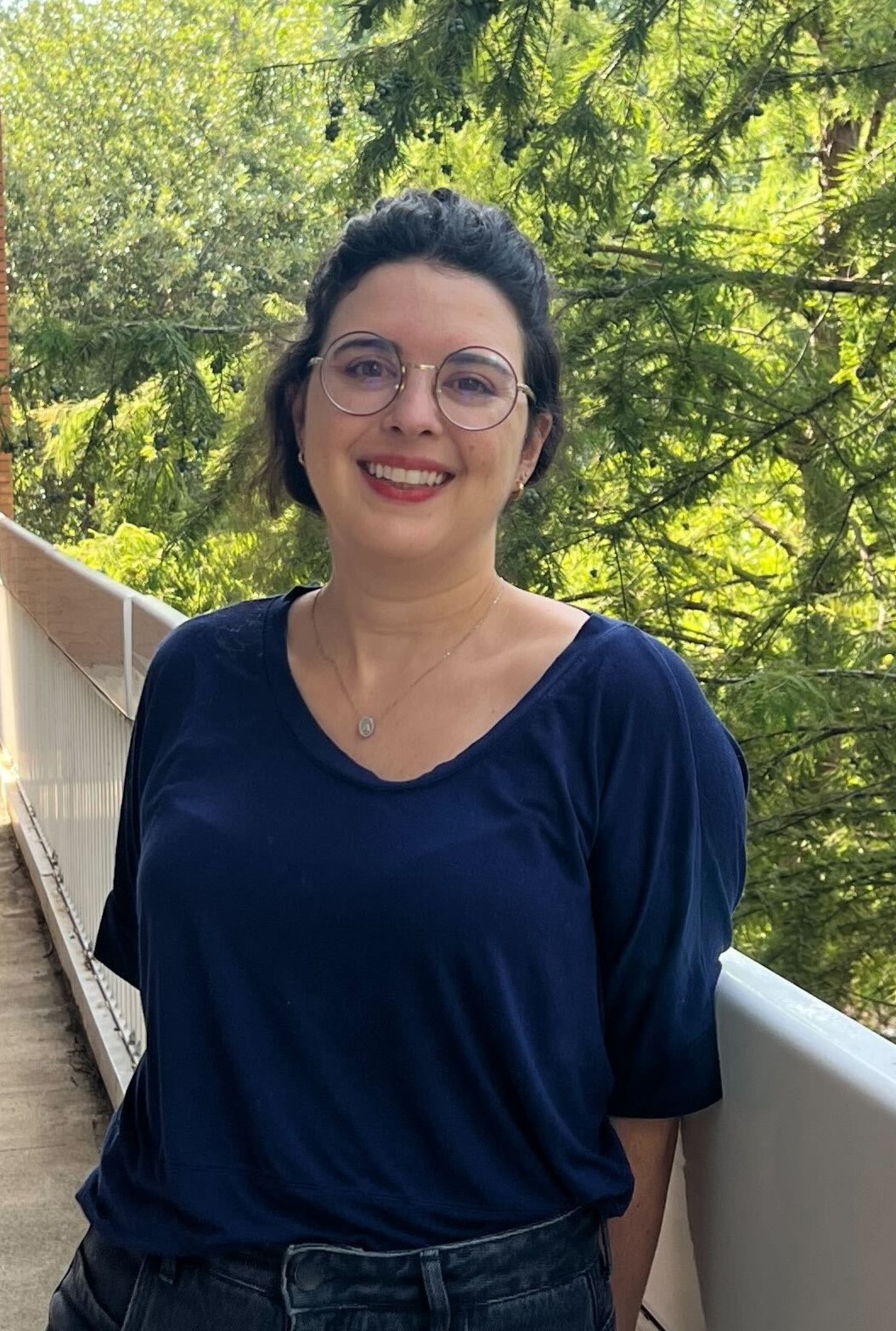
B.Arch, University of Brasilia, Brazil; M.Psych, University of Brasilia, Brazil; Ph.D Technology of Architecture, University of Sao Paulo.
PositionCU Post Doctoral Research FellowContactOffice: 2-143 Lee Hall
Email:BioShe is currently associated with the Center of Healthcare Facilities Design and Testing at Clemson University in South Carolina, working as a Post Doctoral Fellow in Advancing Research in Mental Health through Digital and Built Environment Infrastructure. Her research primarily focuses on people-environment relations and the quality of the built environment. Over the last few years, she has worked as an adjunct researcher at the Environmental Psychology Laboratory at the University of Brasilia and at the Laboratory for Quality and Performance of the Built Environment at the University of São Paulo.
Holds a doctoral degree from the Faculty of Architecture and Urbanism of the University of Sao Paulo, with the research project "Environmental Quality in Psychosocial Treatment Units: A Post-Occupation Evaluation in CAPS AD III units", funded by FAPESP. Graduated in Architecture and Urbanism from the University of Brasília (2013). Has a master's degree in environmental psychology at the Department of Social Psychology at the University of Brasilia. The dissertation is entitled "The Contribution of Urban Trees to Active Mobility". Worked as an adjunct researcher at the Environmental Psychology Laboratory, coordinated by Prof. Dr. Hartmut Günther and Prof. Dr. Isolda Günther, on multidisciplinary and transcultural research projects involving healthy urban mobility and place-making for older people. Along with her practical experience as an architect, she has experience working in multidisciplinary and transcultural research projects in various fields, such as environments for (mental) health, urban mobility, place-making, and co-design.
Byron Edwards, AIA, ACHA (Retired)
B.S. Pre-Architecture, Clemson University (1978); M.Arch, Clemson University (1980)
PositionRetired Professor of Architecture + HealthRichard A. McMahan School of Architecture, Clemson UniversityFaculty Fellow, Clemson University School of Health ResearchContactEmail: byrone@clemson.eduByron Edwards, AIA, ACHA, EDAC, LEED AP is a Professor of Practice in Clemson University’s School of Architecture’s Architecture + Health Graduate Studio. He is a 1980 alumni of Clemson University’s Healthcare Planning and Design Graduate Studio, and he has over 35 years of experience in Healthcare Facilities Planning and Design. Byron’s passion for mentoring and teaching the Research-Based Design Process began as a student at Clemson and has always been a driving force in his Professional career, as well as Academic engagements over the years.Byron is one of the few certified Healthcare Architects in the State of South Carolina, and he is actively involved in a number of committees for the American Institute of Architect’s Academy of Architecture for Health (AIA/AHA), including the South Atlantic Regional Healthcare Chautauqua and the Research Initiatives Committee and the Codes Committee. He is active with the Center for Health Design (CHD) as an Affiliate Member and through his involvement with the Knowledge Repository as a reviewer and critic. He is also involved with the American College of Healthcare Architects (ACHA), where he continues to assist the Exam Committee for which he was a committee member for over 4 years.
In keeping with his interest in both sustainability and research-based practice, Byron is a LEED Accredited Professional and a Certified Evidence-Based Design Professional (EDAC). He is also Owner and Principal of BE THREE LLC, an Architectural Design and Consulting Firm in Charleston, SC; where he continues to practice healthcare programming, planning, and design. His contributions to the profession of Architecture have been recognized with a number of honors and awards, including numerous AIA design awards, some of those were for projects in Charleston, SC and MUSC. He has practiced Research-Based Design (or Evidence-Based Design) throughout his career and recently was awarded an NCARB Grant as a co-investigator for “Defining Best Practices in Ambulatory Care Design for the Medically Underserved Populations: an Integrated and Collaborative Knowledge Research Informed Learning-Practice Model”.
-
Facilities
The Studio
The studio space of the Architecture + Health program is located in 104 Lee hall. The studio was renovated in the Fall of 2010, bringing a healthy and modern space to both students and faculty. New features from the renovation include operable windows, access to the exterior balcony, comfortable lighting, new workstations/computers, a simple kitchen, and an advanced media center. Keeping with our ethos of healthy and creative collaboration, the studio of the MA students is adjacent to the MS/P.h.D students and the research lab.
Check out more images of our studio on our Floor Plan.
-
The Center for Health Facilities Design and Testing
The Center for Health Facilities Design and Testing (CHFD+T) is one of the 55 South Carolina Centers of Economic Excellence (SC CoEE). This Center, based out of Clemson University’s Richard A. McMahan School of Architecture, is an integral part of the Architecture + Health Program. The Center's work is multidisciplinary and projects often include architects, researchers, human factors engineers, and clinicians on the team. CHFD+T researchers focus on high-risk, high-impact clinical areas such as the operating room, the patient room, and the intensive care unit. The projects typically follow an iterative cycle of problem analysis, design and development, implementation, and testing. The goal is to develop human-centered built environment solutions using a systems framework that integrates the built environment, the people in healthcare, technology, tools, and processes. CHFD+T researchers work closely with the students and faculty in the M. Arch. program in Architecture + Health to create evidence-based built environment solutions that bring about change in the healthcare design industry.
Contact
David Allison
David Allison, FAIA, FACHA, NCARB
Email: adavid@clemson.edu | Phone: 864-656-3897
About David Allison

